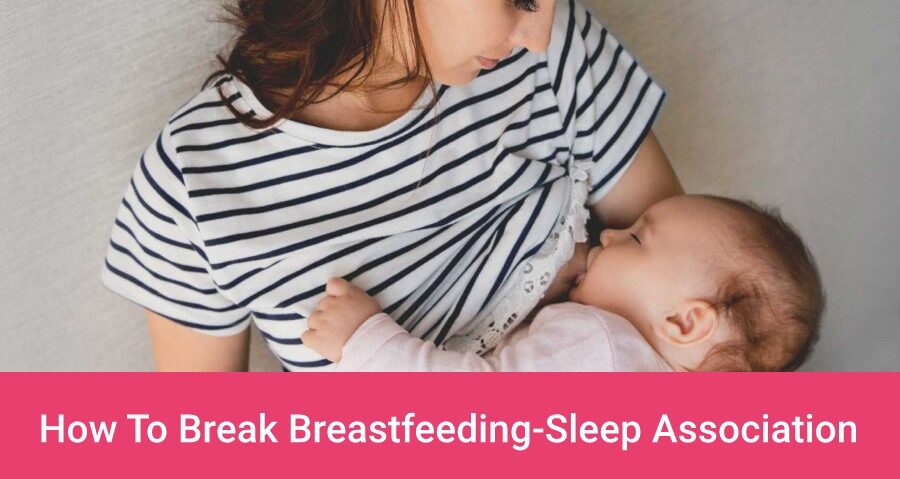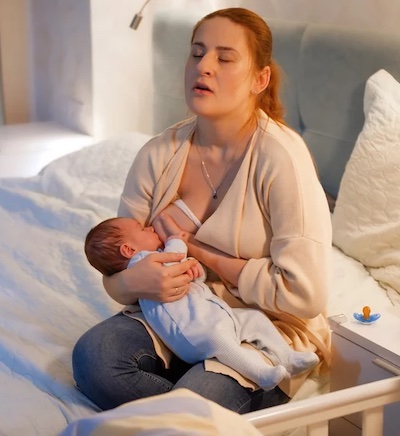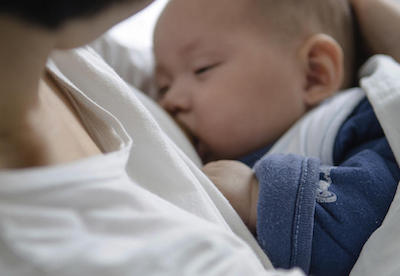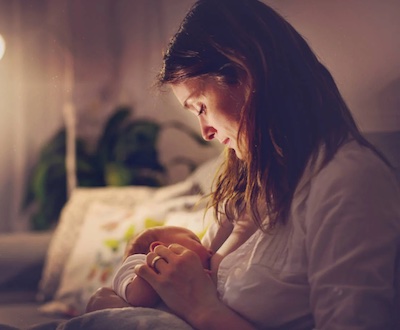
Medically reviewed by Macy Tollefson – doula, breastfeeding specialist & prenatal yoga teacher
Postpartum can be an exhausting and overwhelming time, and navigating breastfeeding on top of it, can definitely add to the challenges.
I’m sure you’ve heard conflicting stories about mothers who comfort nurse at bed time. Some parents don’t mind their baby’s reliance on feeding to sleep, while others think they should stop nursing before bed entirely. In the newborn days, your baby will likely need help going back to sleep, but what about an older baby? Is it a bad habit to soothe them to sleep?
Maybe you’re worried or confused about what is the best decision for you – many moms are! It can be difficult to know how to implement a new routine and when you should stop nursing to sleep.
If you are interested in learning more about breaking your baby’s breastfeeding-sleep association, keep on reading! I’ll walk you through what exactly a sleep association is and how to help your baby (and you!) get better sleep.
This article is not a substitute for medical advice or consultation.
What Is Breastfeeding-Sleep Association?
It’s normal for breastfeeding babies to be so comforted and soothed by nursing, that they fall asleep. Breastfeeding itself is designed to comfort and help your baby sleep!
In fact, breastmilk expressed in the evening actually produces sleep-inducing chemicals like melatonin and tryptophan (among others), to help your baby sleep and regulate their circadian rhythm1! It’s more that nourishment – it’s nurturing as well.
However, if your baby is getting older and they are ONLY able to go to sleep with the association of milk, they may have developed a breastfeeding-sleep association. This term applies to babies who require the act of breastfeeding to fall asleep, and every time they wake up throughout the night.
If your baby is in tears, crying over wanting to nurse for comfort to go back to sleep (rather than out of hunger), then they have likely developed a habit.

Benefits Of Nursing To Sleep
Before you feel any guilt, keep in mind that nursing a baby to sleep is ok!
Think about it this way: your body was your baby’s first home. Of course they feel the most comfortable when they’re with/on you. It is developmentally appropriate for your baby to use YOU as a soothing mechanism.
Babies that feel safe are less likely to be fussy and will transition to independence quicker than a baby who is insecure. Nursing to sleep can help with creating their sense of safety.
Benefits:
- They fall asleep quickly at any time of the day or night (the rhythmic sucking helps with this)2
- Helps baby’s emotional health as they feel safe and comforted.
- They get more calories, nutrients and full feedings.
Babies find breastfeeding to be very soothing, and a great way to bond with you3. Many parents find that this really works for them, and they may choose to not “break” this association at all!
Disadvantages Of Nursing To Sleep
Some moms, on the other hand, may find nursing to sleep to be more of a hindrance, than a help. If you’re feeling overwhelmed or overstimulated, needing to nurse your baby before every single naptime may feel like a lot.
Some disadvantages that parents have expressed include:
- Other caregivers cannot put your baby to sleep for you.
- It can be inconvenient, if you have other children or things to do, and you can’t just stop everything to nurse and put them to sleep.
- It may prolong your child learning independent sleep.
Do Children Outgrow It?
Yes! Rest assured that eventually, all children will learn to fall asleep independently.
Self soothing skills are something that a child will learn with time. The timeline, however, will vary from baby to baby, as all children are different.
If a child feels safe and cared for, they are likely to become independent FASTER, in comparison to babies who were forced into a new developmental stage before they were ready (ex. independent sleep). Forcing a baby to cry it out in their crib or do sleep training can actually prolong independent sleep patterns.
Keep in mind that it is developmentally normal (and encouraged by the World Health Organization) to breastfeed for about two years4. I completely understand the desire to have a baby who falls asleep on their own, but it’s important to remember what is biologically normal for babies.
Breastfeeding is not just about feeding – it’s about comfort as well. But just like they will eventually grow out of crawling, they will stop feeding to sleep.

How To Break Breastfeeding To Sleep Habit
The best way to break the habit of breastfeeding to sleep is to gradually introduce new positive associations and sleep habits. The key is to not make nursing the LAST thing they do before bed.
Try adding these to your baby’s bedtime routine, in replacement of breastfeeding:
- A nightly bath or massage time
- Reading a story
- Rocking to sleep, or letting them fall asleep on you (while not feeding)
Other ways to help break the habit would be:
- Detach them from your breast once they are sleepy, but BEFORE they actually fall asleep. If they wake immediately after doing this, comfort them in another way, like cuddling.
- Try feeding at the beginning of the bedtime routine, so it is not the last thing they experience before falling asleep.
- Let your partner (or another caregiver) put your baby to bed for a change! Your baby likely doesn’t associate them with nursing, so including them in your nightly routine can help break their feeding-sleep association.
- Remember, do NOT try to quit nursing before bed cold-turkey – it’s important to introduce new habits gradually. Your baby will likely protest to changes, but stay consistent. It will get better!

Tips For Establishing Good Sleeping Habits
Good sleeping habits will vary depending on the age of your baby, but the general premise is the same: The goal is to make them feel safe, secure and calm enough to fall asleep quickly and stay asleep.
Establishing good sleep habits is a good idea to start early on. Here are some good sleep habits to consider implementing with your baby:
Under 4 Months Old
- Create a regular sleep schedule, so they learn to expect sleep at certain times of the day.
- Put your baby down to sleep when they are still awake, but drowsy.
- Do not let them “cry it out”- they need to feel safe and secure.
- Keep the lights off (or very dim) when doing night feeds or diaper changes, to keep them sleepy. Because babies sleep so much during the day, you have to help remind them that it’s night time.
- Keep baby’s room (or their sleeping environment) very calming. A dark room will help regulate their circadian rhythms and achieve deep sleep.
4 Months Old And Up
- You will need to update your baby’s sleep schedule (as they will not need as much sleep as in the early days), but continue having a predictable routine.
- Introduce new calming habits to their nighttime routine, like a bath, infant massage or playing a certain song.
- Continue putting your baby down when they are drowsy, but not yet asleep.
- If your baby likes having you with them to sleep, try slipping away as soon as they fall asleep.
- Use white noise to reduce external sounds or anything else that might wake them up.
When Should I Stop Nursing To Sleep?
This is a personal decision, and will be different for everyone. Remember, breastfeeding to sleep in of itself is not a bad thing! Some parents love the time they spend nursing their baby to sleep, while others want their baby to be independent as soon as possible.
As long as you are not neglecting your baby or forcing them into a developmental stage they are not ready for – there really is no wrong answer. The decision is really up to you!
Regardless of your choice, your baby WILL eventually grow out of their breastfeeding-sleep association, just like they will eventually grow out of crawling or using a pacifier. With that being said, if you feel like you need to transition them out of that earlier, there are many different techniques that can help you achieve that.

How Do I Get My Breastfed Baby To Sleep Without Nursing?
There are many different ways to help your baby fall asleep, that don’t include nursing. The key is to develop a calming, positive bedtime routine, and sticking to it.
Try feeding them 20-30 minutes before bedtime, and then help them relax in other ways, before they eventually fall asleep. If the nursing happens too late (i.e. when your baby is already sleepy), then they are likely going to fall asleep while breastfeeding.
You want to help your baby feel calm and drowsy, before being put down in their crib. Some ways to do that can include:
- Infant massage
- Cuddle time (skin to skin with newborns is a great technique!)
- A warm bath
- Suck on a pacifier (for older babies or toddlers)
- Dimming the lights
- Playing soft music
- Swaddling (if your baby enjoys that)
- Light, repetitive movements (like swaying or rocking)
How Long Does It Take To Break Feed To Sleep Association?
Breaking the association depends on how gradually you introduce the new habits, or when you wean them from nursing. If you choose to slowly change their nighttime routine, it could take a few months to break the feed to sleep association.
With that being said, two moms could implement the EXACT same routine and sleep schedules for each of their babies, and they still could have two different results. Every baby is going to be different!
On their own, babies will self-wean from breastfeeding anywhere from 6 months of age to over 2 years – it all depends on the child. The bottom line is that they will eventually “break” the association on their own, but if you implement new habits, you can end it sooner.

How Do I Stop Comfort Nursing At Night?
If your baby wakes throughout the night to comfort feed, then the best thing you can do to is to ensure that they are full BEFORE going to sleep. The same is true during the day – long, fuller feeds will prevent them from cluster feeding or “snacking” throughout the day.
Doing the night feed at the beginning of the bedtime routine will ensure that they are effectively draining your breasts and having a full feed- not falling asleep before they can fill up. If they are receiving adequate nutrition, they should not be waking up to “snack” throughout the day or night5.
Keep in mind that if you’re still in the newborn stage, your baby will be waking every few hours to feed because they are HUNGRY, not for comfort – this is developmentally normal! Further, babies who are up to a year old will wake 1-3 times a night to feed – this is also very normal6.
When Should I Nurse My Baby So I Don’t Create A Breastfeeding-Sleep Association?
The most important way to help break the breastfeeding-sleep association is to NOT feed your baby directly before they fall asleep. Whether it be for naps during the day, or at the end of the night, right before bed.
Try moving your nightly feed to be around 20-30 minutes BEFORE you put them down to sleep in their crib.
Other Negative Sleep Associations
Breastfeeding to sleep is not the only association that some parents may want to break. Your baby may be reliant on a number of things to help them go to sleep!
Some of these include:
- Being rocked to sleep
- Using a pacifier
- A need for comfort object (such as a stuffed animal or blanket)
- Needing you to stay with them until they fall asleep
Again, none of these things are inherently “bad” and they will likely grow out of them eventually! You can implement the same sleep tips listed above, if you wish to break these associations as well.
Article By Macy Tollefson
Macy Tollefson is a full spectrum doula, breastfeeding specialist and prenatal yoga teacher. She is passionate about guiding the modern mama on her journey through the beautiful (and wild) transformation of pregnancy, birth and postpartum. Macy envisions a world where every mother has access to the resources she needs, and follows her intuition to make the best decisions about what is right for her and her baby.
The purpose of this article is informative. It’s not a substitute for professional medical advice or medical care. Remember: safety first! Consult your doctor/pediatrician in case of any doubts. The author of this article does not accept any responsibility for any liability, loss or risk, personal or otherwise, incurred as a consequence, directly or indirectly, from any information or advice contained here.
Resources:
https://parentingscience.com/
https://breastfeeding.support/
https://www.verywellfamily.com/
https://www.who.int/
https://dreamlandbabyco.com/
https://kellymom.com/

